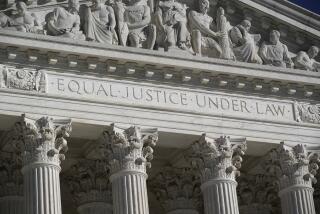In a post-9/11 America, a victory for ‘see something, say something’

This week the Supreme Court overturned a $1.2-million verdict awarded to a pilot who sued his employer for telling the Transportation Security Administration that he might be armed and mentally unstable. Because the decision was based on a 2001 law providing immunity to airline officials who report suspicious behavior, it can be portrayed as another example of the post-9/11 trade-off between security and individual rights (in this case a right to one’s good name).
But that’s too narrow a reading. The legal principles underlying the ruling make sense in other contexts.
The most important of these is that in defamation cases, the defendant is protected if the statement he made about the plaintiff was “materially true.”
The statement at issue in this case was a telephone call in which an official at Air Wisconsin told the TSA that he was concerned about the mental stability of one of its pilots, William Hoeper, and the whereabouts of Hoeper’s gun. Hoeper had failed a proficiency test and faced the loss of his job, and he reportedly “blew up” in frustration at an instructor. Because of the tip, Hoeper was removed as a passenger from an airplane at Dulles Airport. After authorities determined there was no threat, he was allowed to leave on a later flight.
Hoeper sued the airline and convinced a jury that its characterization of his behavior was defamatory. But the judge didn’t tell the jurors that the airline would be immune to judgment if its statement about Hoeper was “materially true.”
All nine justices agreed that was an error. Six concluded that the statement was materially true — meaning that it described “the gist” of the situation involving Hoeper’s outburst, his access to a firearm and the fact that he faced dismissal from his job. Three others would have returned the case to a lower court so a jury could address the truth issue. But that disagreement aside, all nine justices believed a defendant can’t be held liable for a statement that is basically true, even if there are “minor inaccuracies.” That’s an important reaffirmation of a principle that is relevant to all libel cases.
The other takeaway from the decision, which arises in a post-9/11 context but has broader implications, is that well-intentioned people who want to alert police or security agencies about possible threats shouldn’t be deterred by the fear of a libel suit.
Writing for the court, Justice Sonia Sotomayor said: “Congress meant to give air carriers the ‘breathing space’ to report potential threats to security officials without fear of civil liability for a few inaptly chosen words.”
The courts should extend the same breathing space to citizens who report other sorts of disturbing behavior, even if they have nothing to do with airlines or air travel.
ALSO:
State of the Union: Obama’s era of limits
State of the Union: A call for collaboration by the president
How the Democrats can win back the House and keep the Senate -- in 6 steps
Follow Michael McGough on Twitter @MichaelMcGough3
More to Read
A cure for the common opinion
Get thought-provoking perspectives with our weekly newsletter.
You may occasionally receive promotional content from the Los Angeles Times.







